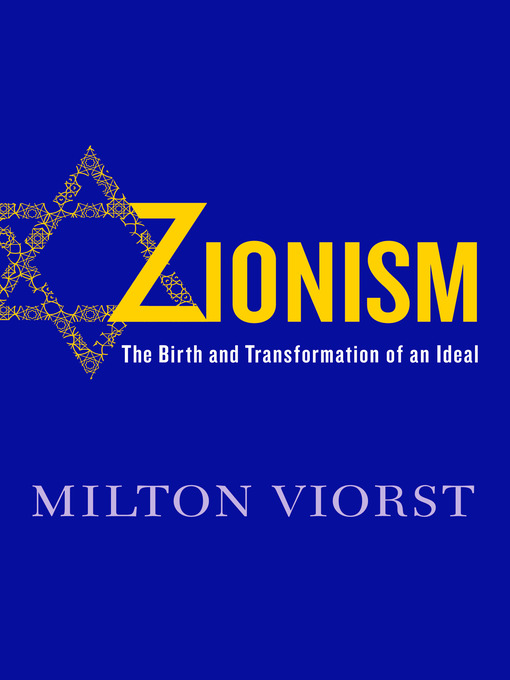
Zionism
The Birth and Transformation of an Ideal
- اطلاعات
- نقد و بررسی
- دیدگاه کاربران
نقد و بررسی

March 15, 2016
An examination of Zionism through its most influential proponents. Former New Yorker Middle East correspondent Viorst (What Shall I Do with This People?: Jews and the Fractious Politics of Judaism, 2002, etc.) takes a largely objective approach to a controversial subject: the quest for a Jewish state. The book will be especially useful to those new to the idea of Zionism and its historical implications while also providing food for thought to readers more engaged with the topic. After setting the stage with a succinct prologue, Viorst discusses Theodor Herzl, widely considered the father of modern Zionism. The author then moves on to Chaim Weizmann, who was influential in bringing about the 1917 Balfour Declaration, which paved the way for the creation of a Jewish state. Next up is Vladimir Jabotinsky, whose militant brand of Zionism was dubbed Revisionism. Viorst takes a subtle stance against Revisionist Zionism throughout the rest of the book, believing that it has left an intractable legacy of violence and of Arab subjugation. David Ben-Gurion, certainly a soldier at heart but not of the Revisionist brand, brought Zionism to a new level of reality with his declaration of the state of Israel in 1948. Revisionism would be taken up in the Israeli leadership by Menachem Begin and given religious sanction through Rav Abraham Isaac Kook and his son Rabbi Zvi Yehuda Kook. Viorst concludes with an examination of the events leading up to the current regime of Benjamin Netanyahu. The author echoes the sentiments of Herzl that once a Jewish state was created, Jews would find it difficult to live with differing points of view. "The chief conflict among Zionists today," he writes, "focuses on whether Israel will make the concessions needed to reconcile with its neighbors, or continue indefinitely to use force to dominate them." Indeed, Viorst's greatest lesson is that the Zionist movement is anything but singular in character. A well-written, balanced, and intriguing reference.
COPYRIGHT(2016) Kirkus Reviews, ALL RIGHTS RESERVED.

May 1, 2016
A cynic once described Zionism thusly: one Jew gives money to another Jew who gives it to a Jewish organization that uses it to send another Jew to Israel. That, of course, is a gross oversimplification. This excellent and sometimes brutally frank history of the Zionist movement illustrates that it was and continues to be a complicated, diverse movement that can mean radically different things to different people at different times. Viorst, a former Middle East correspondent for the New Yorker, is Jewish and describes himself as generally sympathetic to the original Zionists. They were motivated by a desire to achieve both physical security and a cultural renaissance as Jews returned to their ancestral homeland. Zionism represented one stream of Jewish emancipation engendered by the European Enlightenment and identified with many humane ideals. Unfortunately, according to Viorst, some aspects of Zionism are also a product of exclusionist nationalist sentiments, which Viorst feels are strongly influencing contemporary Israel. This informative and provocative work will be an excellent contribution to our understanding of Israel and its role in the Middle East.(Reprinted with permission of Booklist, copyright 2016, American Library Association.)

April 15, 2016
Viorst (Storm from the East; What Shall I Do with This People?) traces the evolution of Zionism from the precursors of Hungarian political activist Theodore Herzl's turn-of-the-20th-century movement as far back as the ideologies of Dutch philosopher Baruch Spinoza. Biographical chapters profile key contributors to Zionism's present development. These include Herzl himself; Chaim Weizmann, the first president of Israel; David Ben-Gurion, Israel's first prime minister; former Israeli prime minister Menachem Begin; Russian author and soldier Ze'ev Jabotinsky; and chief rabbi Abraham Isaac Kook and his son, rabbi Zvi Yehuda Kook. The final chapter contends that current Prime Minister Benjamin Netanyahu's intransigence on the resolution of conflicts with Palestine is the culmination of Zionism's transformation from the practical idealism of Herzl and Weizmann to the reliance on military strength advocated by Jabotinsky and implemented by Begin. While Viorst gives some attention to attempts by former prime ministers Yitzchak Rabin and Ariel Sharon to find a way for Zionism to coexist with Palestinian nationalism and Arab nations, the author faults Zionists (both left and right) for missing opportunities. VERDICT This history is more movingly told in Ari Shavit's My Promised Land: The Triumph and Tragedy of Israel, but Viorst triumphs in offering a succinct presentation of a long struggle. [See Prepub Alert, 11/9/15.]--Joel Neuberg, Santa Rosa Junior Coll. Lib., CA
Copyright 2016 Library Journal, LLC Used with permission.

December 1, 2015
A former Middle East correspondent for The New Yorker, Viorst here offers a thoroughgoing history of Zionism, from the Enlightenment to Europe's violent anti-Semitism in the 20th century to Israel today. He argues that Israel has squandered the goodwill that came to it naturally at its founding.
Copyright 2015 Library Journal, LLC Used with permission.




دیدگاه کاربران